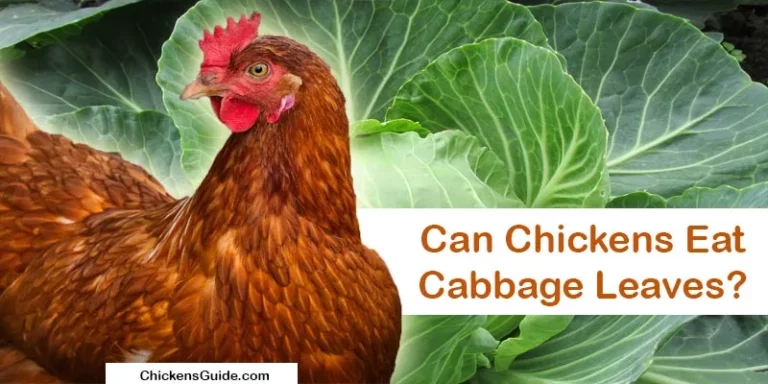Chickens are one of the most popular animals to keep as pets. They’re easy to care for, they produce their own food and they provide eggs. While chickens will eat just about anything (including grass, bugs, and worms) there are some things that you should never feed them! What about cabbage leaves?
Can Chickens Eat Cabbage Leaves?
Cabbage leaves are a good source of vitamins, calcium, and fiber. Chickens can eat cabbage leaves as part of their diet for these reasons. However, this is not a regular food for chickens and should only be given to them occasionally.
Are There Any Risks When Feeding Cabbage Leaves To Chickens?
Feeding your chickens cabbage leaves is generally safe, but there are some risks.
Your chickens can get an upset stomach if they eat too many cabbage leaves at once.
They also have a higher chance of getting bloat when they consume large amounts of cabbage leaf material.
In addition, if the cabbage was treated with pesticides and other chemicals, it could harm your chickens. For that reason, it’s best to only feed them cabbage leaves that are organically grown.
Benefits Of Cabbage Leaves For Chickens
Cabbage leaves are a great source of vitamin A, vitamin C, and vitamin K. They are also high in fiber and low in calories making them a great addition to your chicken’s diet.
Here are some of the benefits of cabbage leaves for chickens:
- They can be used as an antiseptic to treat wounds or ulcers.
- They can be used to help treat respiratory problems like pneumonia and bronchitis.
- Cabbage leaves are high in vitamin C, which helps boost the immune system and fight off disease or infection.
- The fiber found in cabbage leaves helps keep your chicken’s digestive tract moving smoothly, preventing blockages or constipation from forming in its intestinal tract.
Can Baby Chickens Eat Cabbage Leaves?
You may be wondering if baby chickens can eat cabbage leaves. The short answer is yes! Baby chickens (known as “chicks” when they’re young) are omnivores, which means that they can eat a wide variety of foods including vegetables and fruit.
Cabbage leaves are an excellent food source for baby chicks because they contain vitamins, minerals, and fiber—all of which contribute to proper growth and development in chicks.
In addition to being nutritious, cabbage leaves are also easy for chicks to digest; this is important because, during the first few weeks after hatching from their eggs, baby chickens have undeveloped digestive systems that aren’t capable of properly breaking down meat or other more complex foods.
How To Feed Cabbage Leaves To Chickens
There are two ways to feed cabbage leaves to chickens:
Raw – If you have access to fresh cabbage, simply tear off a leaf and give it wholly to your chicken. They will chew on it and eat it whole, but some may not get down all of the leaves because of their size.
You can also add cabbage leaves to your chicken’s water or feed. The leaves will float on top of the water so you may need to stir them up before feeding them to your flock.
Cooked – Cooked cabbage has more nutritional value than raw cabbage because it converts some of its nutrients into “bioactive” forms that are easier for your birds’ bodies to absorb. As an added bonus, cooking reduces any bitterness in the leaves (which can happen with certain varieties).
How Often Can Chickens Eat Cabbage Leaves?
This will depend on your chickens’ needs, but you should be able to feed them cabbage leaves once or twice a week.
If you feed them too often, they may get sick and stop eating altogether because of the large amount of fiber in cabbage. In addition, feeding them too much could experience diarrhea as well as other digestive issues.
If you feed them too little, they won’t be getting enough nutrients.
Therefore, once or twice per week is enough for them to enjoy without having any digestive issues.
Conclusion
Not only can chickens eat cabbage, but they can eat cabbage leaves as well. This is a great way for your chickens to get extra vitamins and minerals. However, it’s important not to overfeed them so that you don’t end up with health problems. You should also avoid feeding cabbage leaves if you notice any signs of illness in your flock or when they are molting during the winter months.


